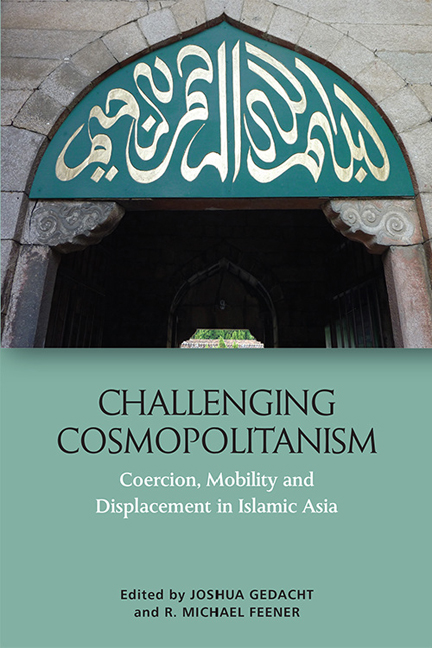Book contents
- Frontmatter
- Contents
- Preface
- 1 Hijra, Ḥajj and Muslim Mobilities: Considering Coercion and Asymmetrical Power Dynamics in Histories of Islamic Cosmopolitanism
- 2 Islamicate Cosmopolitanism from North Africa to Southeast Asia
- 3 Sufi Cosmopolitanism in the Seventeenth-century Indian Ocean: Sharīʿa, Lineage and Royal Power in Southeast Asia and the Maldives
- 4 The White Heron Called by the Muezzin: Shrines, Sufis and Warlords in Early Modern Java
- 5 Variations of ‘Islamic Military Cosmopolitanism’: The Survival Strategies of Hui Muslims during the Modern Period
- 6 Writing Cosmopolitan History in Nineteenth-century China: Li Huanyi’s Words and Deeds of Islamic Exemplars
- 7 The ‘Shaykh al-Islām of the Philippines’ and Coercive Cosmopolitanism in an Age of Global Empire
- 8 Bordering Malaya’s ‘Benighted Lands’: Frontiers of Race and Colonialism on the Malay Peninsula, 1887–1902
- 9 Afghanistan’s Cosmopolitan Trading Networks: A View From Yiwu, China
- Notes on the Contributors
- Index
7 - The ‘Shaykh al-Islām of the Philippines’ and Coercive Cosmopolitanism in an Age of Global Empire
Published online by Cambridge University Press: 01 May 2021
- Frontmatter
- Contents
- Preface
- 1 Hijra, Ḥajj and Muslim Mobilities: Considering Coercion and Asymmetrical Power Dynamics in Histories of Islamic Cosmopolitanism
- 2 Islamicate Cosmopolitanism from North Africa to Southeast Asia
- 3 Sufi Cosmopolitanism in the Seventeenth-century Indian Ocean: Sharīʿa, Lineage and Royal Power in Southeast Asia and the Maldives
- 4 The White Heron Called by the Muezzin: Shrines, Sufis and Warlords in Early Modern Java
- 5 Variations of ‘Islamic Military Cosmopolitanism’: The Survival Strategies of Hui Muslims during the Modern Period
- 6 Writing Cosmopolitan History in Nineteenth-century China: Li Huanyi’s Words and Deeds of Islamic Exemplars
- 7 The ‘Shaykh al-Islām of the Philippines’ and Coercive Cosmopolitanism in an Age of Global Empire
- 8 Bordering Malaya’s ‘Benighted Lands’: Frontiers of Race and Colonialism on the Malay Peninsula, 1887–1902
- 9 Afghanistan’s Cosmopolitan Trading Networks: A View From Yiwu, China
- Notes on the Contributors
- Index
Summary
In 1912, an American military officer, Major John P. Finley, departed from his post in a remote corner of the US Empire, in the ‘Moroland Province’ of Mindanao and Sulu, a predominantly Muslim stretch of the southern Philippines. By this time, Finley had already logged nearly ten years in the troubled region. During his tenure, ongoing US military campaigns visited significant violence upon the local Muslim ‘Moro’ population, killing between 600 and 1,000 people in a single battle alone. Yet, by 1913, American rulers had committed themselves to a transition from a military regime towards nominally civilian rule. The new pro-consul in Mindanao and future Commander of the Allied Forces in the First World War, General John J. Pershing, sought to remove all army officers from district governorships and to replace them with civilians. Major John Finley's departure thus appeared to herald the end of his Moroland service.
Yet John Finley did not consider his mission to be complete. Once the major returned to the United States, he did not abandon plans to return to the Philippines. Quite to the contrary, his own personal writings and his subsequent actions make it clear that the major still believed he had more work to do, that he needed to help rid Mindanao of the scourge of violent resistance, ensure the consolidation of law and order and, perhaps most importantly, help to solve the intractable ‘Mohammedan Problem’. Finley believed that if only he could defuse the local tendency towards rebelliousness by demonstrating ‘respect’ for Islam, American rule could finally be secure. And the most critical step on this path to completing colonial hegemony lay neither in the Philippines nor the United States nor even somewhere nearby in Southeast Asia. This path instead took Finley from Zamboanga to Washington and onward to the cosmopolitan, if distant, capital of the most influential Muslim kingdom on earth: the city of Istanbul in the Ottoman Empire.
Two years earlier, a Mindanaoan Muslim and a close ally of Major Finley, Ḥaji Abdullah Nuño, had helped to draft a petition in the local language of Tausug directed to the Ottoman sultan with a request for assistance in the affairs of Islam.
- Type
- Chapter
- Information
- Challenging CosmopolitanismCoercion, Mobility and Displacement in Islamic Asia, pp. 172 - 202Publisher: Edinburgh University PressPrint publication year: 2018



